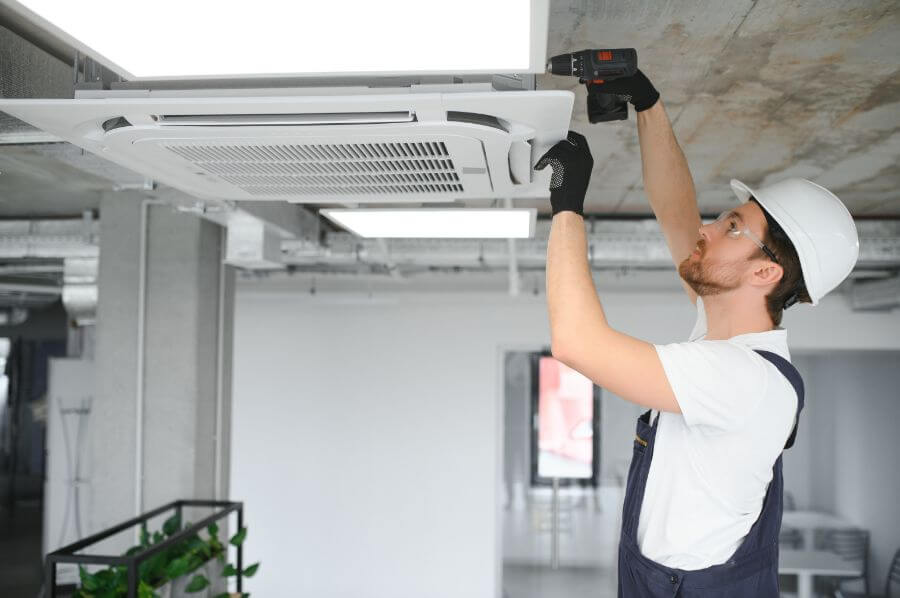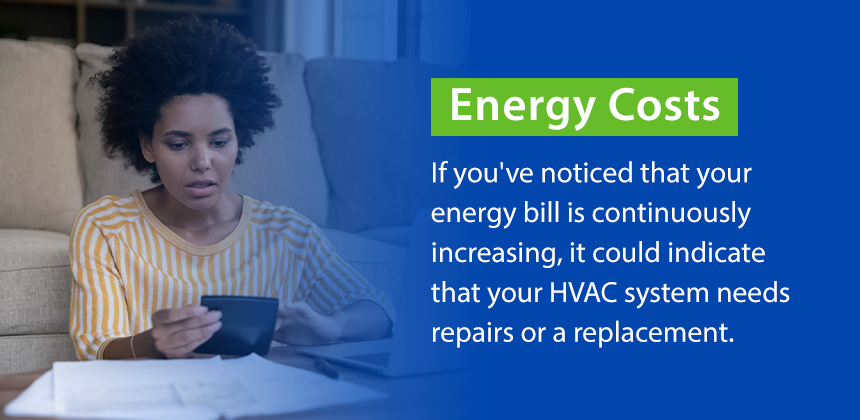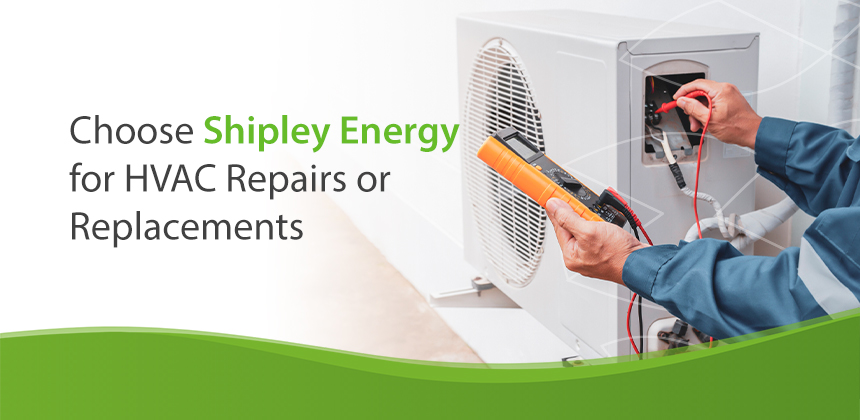
HVAC systems require regular maintenance and inspections, but your system will likely need repairs throughout its life span. However, there comes a time when you will need to replace your HVAC system since an older system can stop working or may require frequent repairs that are out of your budget.
There are many different factors to consider to know when to repair or replace your HVAC systems, such as age, budget, energy costs, energy efficiency and your home’s comfort. In this chapter, you’ll learn about the factors you should consider when replacing or repairing your HVAC system.
There have been a lot of changes in air conditioning systems, such as improvements in technology and changes to environmental regulations. If your unit continually breaks down or isn’t providing the same heating and cooling as before, it could be worth considering a replacement instead of more repairs. There are different factors to consider when deciding whether to repair or replace your HVAC system, including:
Consider how old your HVAC system is when deciding whether to repair or replace it. Experts generally recommend replacing your HVAC system every 15 to 20 years. If your HVAC system is not that old but you see constant problems, it still might be worth replacing it.
If small repairs can return your HVAC system to peak operation, a full replacement isn’t worth it. Repairs often mean you get many more useful years from your equipment. Work with an HVAC professional to determine how efficient your current system is and whether an HVAC system repair or replacement would be better for your situation.
Your budget is a significant factor when deciding between repairs or replacements. If you have a lower budget and only need simple repairs to keep your HVAC system operational, choosing repairs is the obvious choice. However, even though repairs are less expensive than replacing equipment, frequent repairs may cost you more over time. If you’re seeing more repairs, it may be worth investing in a new HVAC system. You’ll save more in the long run by reducing repair costs and improving energy efficiency. A professional technician can help you determine the HVAC replacement cost versus the HVAC repair cost.
As noted above, if your HVAC equipment often breaks or has continual issues, it’s probably time to replace it. As HVAC systems approach the end of their life span, breakdowns can become more frequent, even with the proper maintenance and inspections. Repairs cost less than buying new equipment, but constant repairs can be expensive over time and may not be worth it in the long run. Estimate expected repair costs compared to getting a new system. If you’d spend as much or more on repairs, investing in a new system can reduce your overall spending.
Many homeowners are concerned about safety. Outdated or malfunctioning HVAC systems can be a hazard. For example, if your heating system fails while you’re on vacation, you could come home to burst pipes and significant water damage. Sudden failures and the damage they cause are generally costly to repair.
If you’re concerned that your current HVAC system is no longer safe, consider a replacement. An HVAC technician can evaluate your current system and determine if repairs are enough to keep your home safe. If they recommend a replacement, they can help you choose the best system for your situation.
The federal government banned the production or importation of R-22 Freon in 2020 because of the damage it does to the ozone layer. As a result, existing Freon inventory has become very expensive. If your existing HVAC system uses R-22 Freon, you’ll need to switch to equipment using R410A refrigerant in the future. If your equipment has issues related to Freon requirements, it’s likely a good time to consider a replacement. In addition to using a non-ozone-depleting refrigerant, newer models are generally more energy efficient and generally use less fuel or electricity to keep your home comfortable.

You’ll likely experience different energy cost changes throughout the year during different seasons. However, your bill should be relatively stable during each season and comparable to the previous year. If you’ve noticed that your energy bill is continuously increasing, it could indicate that your HVAC system needs repairs or a replacement.
An HVAC technician can inspect your system and recommend whether a repair or a replacement would be better. Significant repairs could be costly, so replacing an older unit that requires frequent repairs might be worth the additional cost. New equipment can also help you save on your energy costs by making your system more efficient at cooling and heating your home.
A well-maintained HVAC system doesn’t make a lot of noise. As parts wear out or your equipment ages, you may start hearing unusual noises from your system, such as grinding or squealing. Contact your HVAC technician to determine the cause of the noise if you notice strange sounds.
Additionally, you may notice an unusual smell coming from your system. Sometimes, this smell is the dust burning off when you first turn on your heating system for the season. This small may be familiar and generally doesn’t last very long. However, strange or lingering smells can also mean more significant problems, such as melting wiring or mold in your ducts.
Contact an HVAC professional to inspect your system and determine the source of strange noises and smells. Once they’ve found the problem, they’ll recommend a repair or replacement. Strange noises or odors may indicate a major issue requiring costly repairs. Depending on your budget and other factors, new equipment may be a better investment compared to frequent or expensive repairs.
Your HVAC system does more than cool and heat your home. It also ventilates your home and prevents particles from circulating in the air. An efficient system will improve your home’s air quality by removing things such as dust, dander, dirt and debris and managing the humidity in your home. If you notice more dust accumulating or increasing humidity levels, there could be a problem with your system’s efficiency.
Repairs might bring back your system’s efficiency, but you may also need to replace your equipment. A professional HVAC technician can help you determine whether a simple repair can improve your system’s efficiency or if you need a replacement.
Many people consider energy efficiency when deciding whether to repair their existing HVAC equipment or invest in a new system. Older units aren’t as energy efficient as newer models and could be costing you more in fuel than you realize. Investing in a more energy-efficient system can increase your energy savings and improve the comfort of your home. The cost savings from increased efficiency may be worth the initial investment.
Newer models can make your home feel the way you want, improving your household’s comfort. Innovations such as smart thermostats and zoning technology offer superior climate control and increased comfort. Older systems generally don’t have the same flexibility or customization options as modern systems. An updated system can be a worthwhile investment if you want to control different parts of your home separately. Talk with an HVAC technician to find a system that meets your needs, whether you want one that maintains consistent temperatures throughout the home or allows you to customize temperatures based on the room.

Your HVAC system helps maintain your home’s comfort. When your equipment breaks down, it can be difficult to know whether repairs or replacements are better. Shipley Energy can help you decide whether your HVAC system needs repairs or replacements. Our technicians are highly skilled and can help you create an efficient HVAC system that keeps your household comfortable. Contact us today to learn more about our HVAC service or to schedule an appointment.